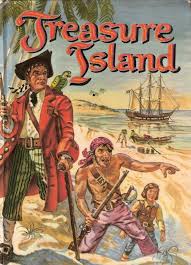Treasure Island Page #6
Treasure Island is an adventure novel by Scottish author Robert Louis Stevenson, narrating a tale of "buccaneers and buried gold".
The hamlet lay not many hundred yards away, though out of view, on the other side of the next cove; and what greatly encouraged me, it was in an opposite direction from that whence the blind man had made his appearance and whither he had presumably returned. We were not many minutes on the road, though we sometimes stopped to lay hold of each other and hearken. But there was no unusual sound--nothing but the low wash of the ripple and the croaking of the inmates of the wood. It was already candle-light when we reached the hamlet, and I shall never forget how much I was cheered to see the yellow shine in doors and windows; but that, as it proved, was the best of the help we were likely to get in that quarter. For--you would have thought men would have been ashamed of themselves--no soul would consent to return with us to the Admiral Benbow. The more we told of our troubles, the more--man, woman, and child--they clung to the shelter of their houses. The name of Captain Flint, though it was strange to me, was well enough known to some there and carried a great weight of terror. Some of the men who had been to field-work on the far side of the Admiral Benbow remembered, besides, to have seen several strangers on the road, and taking them to be smugglers, to have bolted away; and one at least had seen a little lugger in what we called Kitt's Hole. For that matter, anyone who was a comrade of the captain's was enough to frighten them to death. And the short and the long of the matter was, that while we could get several who were willing enough to ride to Dr. Livesey's, which lay in another direction, not one would help us to defend the inn. They say cowardice is infectious; but then argument is, on the other hand, a great emboldener; and so when each had said his say, my mother made them a speech. She would not, she declared, lose money that belonged to her fatherless boy; “If none of the rest of you dare,” she said, “Jim and I dare. Back we will go, the way we came, and small thanks to you big, hulking, chicken-hearted men. We'll have that chest open, if we die for it. And I'll thank you for that bag, Mrs. Crossley, to bring back our lawful money in.” Of course I said I would go with my mother, and of course they all cried out at our foolhardiness, but even then not a man would go along with us. All they would do was to give me a loaded pistol lest we were attacked, and to promise to have horses ready saddled in case we were pursued on our return, while one lad was to ride forward to the doctor's in search of armed assistance. My heart was beating finely when we two set forth in the cold night upon this dangerous venture. A full moon was beginning to rise and peered redly through the upper edges of the fog, and this increased our haste, for it was plain, before we came forth again, that all would be as bright as day, and our departure exposed to the eyes of any watchers. We slipped along the hedges, noiseless and swift, nor did we see or hear anything to increase our terrors, till, to our relief, the door of the Admiral Benbow had closed behind us. I slipped the bolt at once, and we stood and panted for a moment in the dark, alone in the house with the dead captain's body. Then my mother got a candle in the bar, and holding each other's hands, we advanced into the parlour. He lay as we had left him, on his back, with his eyes open and one arm stretched out. “Draw down the blind, Jim,” whispered my mother; “they might come and watch outside. And now,” said she when I had done so, “we have to get the key off THAT; and who's to touch it, I should like to know!” and she gave a kind of sob as she said the words. I went down on my knees at once. On the floor close to his hand there was a little round of paper, blackened on the one side. I could not doubt that this was the BLACK SPOT; and taking it up, I found written on the other side, in a very good, clear hand, this short message: “You have till ten tonight.” “He had till ten, Mother,” said I; and just as I said it, our old clock began striking. This sudden noise startled us shockingly; but the news was good, for it was only six. “Now, Jim,” she said, “that key.” I felt in his pockets, one after another. A few small coins, a thimble, and some thread and big needles, a piece of pigtail tobacco bitten away at the end, his gully with the crooked handle, a pocket compass, and a tinder box were all that they contained, and I began to despair. “Perhaps it's round his neck,” suggested my mother. Overcoming a strong repugnance, I tore open his shirt at the neck, and there, sure enough, hanging to a bit of tarry string, which I cut with his own gully, we found the key. At this triumph we were filled with hope and hurried upstairs without delay to the little room where he had slept so long and where his box had stood since the day of his arrival. It was like any other seaman's chest on the outside, the initial “B” burned on the top of it with a hot iron, and the corners somewhat smashed and broken as by long, rough usage. “Give me the key,” said my mother; and though the lock was very stiff, she had turned it and thrown back the lid in a twinkling. A strong smell of tobacco and tar rose from the interior, but nothing was to be seen on the top except a suit of very good clothes, carefully brushed and folded. They had never been worn, my mother said. Under that, the miscellany began--a quadrant, a tin canikin, several sticks of tobacco, two brace of very handsome pistols, a piece of bar silver, an old Spanish watch and some other trinkets of little value and mostly of foreign make, a pair of compasses mounted with brass, and five or six curious West Indian shells. I have often wondered since why he should have carried about these shells with him in his wandering, guilty, and hunted life. In the meantime, we had found nothing of any value but the silver and the trinkets, and neither of these were in our way. Underneath there was an old boat-cloak, whitened with sea-salt on many a harbour-bar. My mother pulled it up with impatience, and there lay before us, the last things in the chest, a bundle tied up in oilcloth, and looking like papers, and a canvas bag that gave forth, at a touch, the jingle of gold. “I'll show these rogues that I'm an honest woman,” said my mother. “I'll have my dues, and not a farthing over. Hold Mrs. Crossley's bag.” And she began to count over the amount of the captain's score from the sailor's bag into the one that I was holding.
Translation
Translate and read this book in other languages:
Select another language:
- - Select -
- 简体中文 (Chinese - Simplified)
- 繁體中文 (Chinese - Traditional)
- Español (Spanish)
- Esperanto (Esperanto)
- 日本語 (Japanese)
- Português (Portuguese)
- Deutsch (German)
- العربية (Arabic)
- Français (French)
- Русский (Russian)
- ಕನ್ನಡ (Kannada)
- 한국어 (Korean)
- עברית (Hebrew)
- Gaeilge (Irish)
- Українська (Ukrainian)
- اردو (Urdu)
- Magyar (Hungarian)
- मानक हिन्दी (Hindi)
- Indonesia (Indonesian)
- Italiano (Italian)
- தமிழ் (Tamil)
- Türkçe (Turkish)
- తెలుగు (Telugu)
- ภาษาไทย (Thai)
- Tiếng Việt (Vietnamese)
- Čeština (Czech)
- Polski (Polish)
- Bahasa Indonesia (Indonesian)
- Românește (Romanian)
- Nederlands (Dutch)
- Ελληνικά (Greek)
- Latinum (Latin)
- Svenska (Swedish)
- Dansk (Danish)
- Suomi (Finnish)
- فارسی (Persian)
- ייִדיש (Yiddish)
- հայերեն (Armenian)
- Norsk (Norwegian)
- English (English)
Citation
Use the citation below to add this book to your bibliography:
Style:MLAChicagoAPA
"Treasure Island Books." Literature.com. STANDS4 LLC, 2025. Web. 22 Jan. 2025. <https://www.literature.com/book/treasure_island_32>.




Discuss this Treasure Island book with the community:
Report Comment
We're doing our best to make sure our content is useful, accurate and safe.
If by any chance you spot an inappropriate comment while navigating through our website please use this form to let us know, and we'll take care of it shortly.
Attachment
You need to be logged in to favorite.
Log In